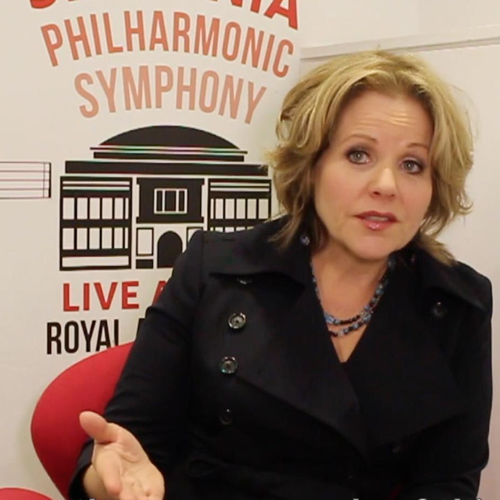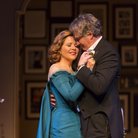Renée Fleming And The Secrets Of A Soprano
Renée Fleming reveals to Classic FM the trials and tribulations of being a singer at the top of her profession.
What’s the secret behind the art of the opera singer? How, night after night, does a soprano create that sheer wall of sound over a huge orchestra, spinning those high notes, and, above all, creating a musically and dramatically convincing performance, all without either losing her voice or collapsing from physical and mental exhaustion?
If anyone knows the secret, it’s Renée Fleming: epitome of glamour, mother of two and owner of possibly the most beautiful, effortless-sounding lyric soprano voice in the world. She tells her story in her new autobiography, The Inner Voice.
“I wanted to write the book to be honest and up-front about everything to do with a career in singing and the whole lifestyle,” she says from her home in New York City.
“I’d not seen that sort of information available before. I wrote the book largely for young singers who are starting out in the profession, to show them what they’re getting themselves into! But the book is also for the appreciative members of the public who want to know about what we do.”
This is the story of how the shy, hard-working, pony-mad girl from Churchville, New York State, grew up to be one of the finest and most successful musicians in the world, while combining her hectic schedule with raising her daughters, Amelia (12) and Sage (9).
She tells of a happy suburban childhood, early lessons with her singing- teacher parents, her college years at the State University of New York and the Juilliard School, where she flirted with the idea of becoming a jazz singer, and her time as a Fulbright scholar in Germany (Renée speaks fluent German as a result).
Having made it to the top of her profession, she’s celebrated for her interpretative artistry, those silvery, weightless high notes and creamy, voluptuous middle register. But all this didn’t come naturally. Renée’s story is one of relentless self-discipline and a constant quest for perfection.
“I used to find it frustrating when people said, ‘You’re lucky that singing comes so easily to you.’ They don’t realise how much work goes into it. But I take it as a compliment now.”
Renée tells how just tilting her chin an inch higher or lower can adversely affect the quality of a note. It’s a fascinating insight into the extraordinary detail that goes into creating the operatic voice. It seems that the life of a singer is akin to that of a finely tuned athlete. This includes taking care of her body. Renée tells of her struggle with the bane of the opera singer’s image – excess weight. Although now trim and healthy-looking, this wasn’t always the case – especially after the birth of her younger daughter, Sage.
“My producer sat me down one day and spelled it out for me. ‘I know you want this very badly. If you want it enough, you’ll lose the weight.’ Of course I knew I was overweight, but it was jarring to hear it in plain speech from a professional I admired.”
But help was at hand from her friend and colleague, the mezzo-soprano Susan Graham.
“When Susan explained the low-carb diet theory to me, things finally started to turn around. I discovered over time that I am most comfortable with a low-carbohydrate, low-fat diet, focused on green vegetables, berries and soy-based proteins.”
Exercise also plays a large part in her keeping fit.
“I discovered the wonders of Pilates. The best part of it is the intense focus on core strength, which we singers need almost as much as dancers.”
Carving out a successful career as a classical singer requires the mental discipline of an athlete, too – a curious combination of knowing when to take advice from others and when to stand by one’s own convictions. Does Renée feel she has a core of steel?
“For anyone who has an intense desire to do something, you need a combination of resilience and self-belief,” she says. “It was such a rocky road at the beginning, both learning how to sing and then getting my career started. It takes so much time and effort and if I didn’t have those qualities I’m sure it wouldn’t have happened.”
There was a period, however, when her nerve nearly failed her. Around the time of her divorce in 1998, and at the height of her career, she began to experience debilitating attacks of stage fright. She describes horrifying, full-blown panic attacks, fighting back against a bullying conductor who wanted to drop her from a first night, and an excruciating account of being booed at La Scala. These knocks took their toll, and Renée seriously thought about giving up, “finding a nice teaching job somewhere in the Midwest, raising my girls and calling it a day.”
But, with help from a psychiatrist who specialises in working with people with “success conflict”, she found her way through this difficult period.
“The possibility of losing my identity as a singer and losing my career was really too painful.”
Now, at the age of 46, Renée is at the very peak of a soprano’s career. What’s next for her? She is about to release two discs – an album of spiritually inspired music called Sacred Arias and a new recording of Richard Strauss’s opera Daphne. She’s also recently returned to her jazz roots with an album of torch songs, Haunted Heart.
Further ahead, she plans to go on singing for many, many years. “I really admire [the Italian soprano] Mirella Freni. She’s taken such good care of her voice. I heard her sing recently – it was actually her farewell gala. She sang so incredibly well, and she’s 70 years old.”
With everything we know about Renée Fleming, this wonderful singer is also bound to delight her audiences for years to come.








